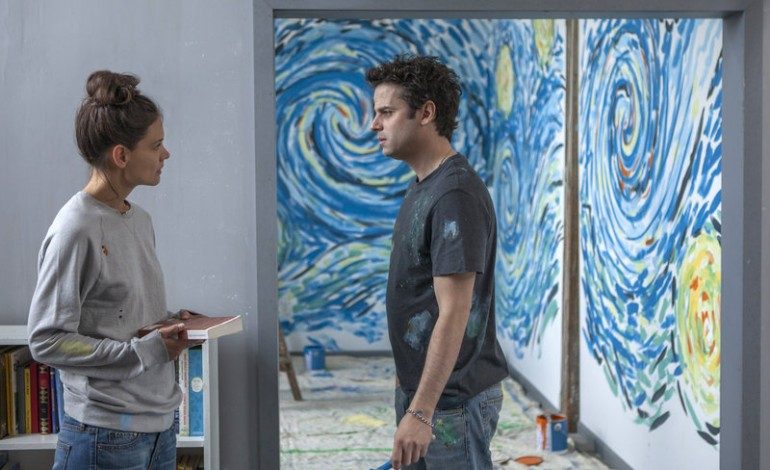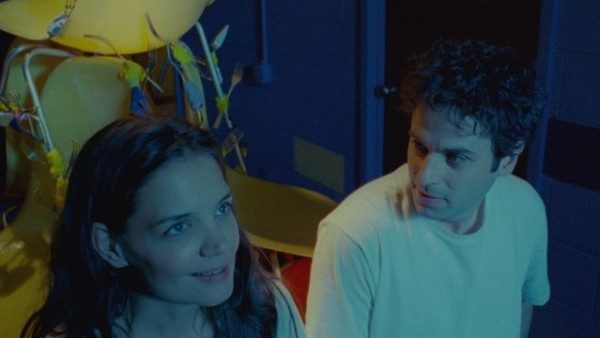

On terms of ambition, writer-director Paul Dalio deserves a healthy dose of credit for threading two exceedingly difficult, typically less than cinematic themes into his bittersweet romance Touched with Fire. In this economical, if slightly under-cooked drama, Dalio explores both mental illness and the impetus of the creative process. In detailing the romance of Carla (Katie Holmes, Woman in Gold) and Marco (Luke Kirby, Take This Waltz), two poets who struggle from bipolar disorder, Dalio attempts a balanced portrait of the exploration of art and love through the prism of two characters touched with singular gifts and obstacles.
In Touched with Fire‘s most vital moments, the biopolar experience feels explored with refreshingly frank honesty and alertness. Taking cues from Kay Redford Jamison’s book Touched with Fire: Manic Depressive Illness and the Artistic Temperament as well as likely Dalio’s open struggles with the disorder himself, there’s a ping of truthfulness in the idea that the birth of creativity is perhaps just as likely matched with a certain degree of interior madness. That’s why Marco, with great zeal, hangs on to the notion that Van Gogh’s masterpiece “The Starry Night” was not impressionism in the slightest but exactly how the painter really saw the outside world. Marco serves this as justification for bailing on his medication; he needs his mania to keep his creative juices flowing. It’s a provocative assessment.
But Touched with Fire is ultimately more interested in the love story at its center, which while sensitively wrought, is a bit sleepy, slight and less involving as it chugs along. We meet Carla and Marco, separately at first but each experiencing a shared sense of turmoil. Carla, who has achieved at least some notoriety through a collection of published poems, is unsure and tentative but quietly inquisitive about the roots of her illness- her mother (Christine Lahti) is patient and observant, but doesn’t seem to be providing the answers that Carla is in need of. Marco, by contrast, is a tightly coiled rap-poet who professes, almost militantly so he professes to his worrying father (Griffin Dunne) that his current manic high is healthily spurring his artistic expression. He won’t be numbed. In short, both end up in a mental hospital.
Thankfully, Dailo (for the most part) avoids obvious meet-cute troupes. Carla and Marco exhibit hesitation at first but are connected by art and literature and soon enough build up an imaginary fortress all to themselves, sparked by possibility and the yearn for expression. In classic star-crossed tradition, both design a sort of “us versus the world” front even though there’s no definitive reason why this coupling should have a happy ending. Dailo, as a filmmaker and a writer, infuses an energetic and nearly invigorating pace to the couple’s late night “secret meetings.” Both are feeding and enabling each others mania, but there’s a somewhat kinetic romanticism at its core that’s charming and even slightly fresh. Never mind that the dynamics of the hospital itself make little sense (3AM rendezvous in a mental ward?) or that the hospital staff are thinly and cluelessly shaped.
Touched with Fire loses some its early fire and comes down to earth as do Carla and Marco as both are deemed unsuitable for one another and sequestered to their familial corners. In a touch that’s a bit too on the nose, this is chronicled in a wintry montage (the film is separated by the changing seasons) of Carla and Marco coming down for their romantic, metaphysical high, visually represented through a fog of blue filters and angst-ridden shots of our bed-ridden love birds. The heart goes on and so does the movie and our lovers desire to reunite, but Dailo’s early momentum starts to recede.
As do the performances, unfortunately. Holmes and Kirby are likable and appealing leads but as the narrative starts to bend and slightly repeat itself in the second half, the chemistry between the two seems less and less apparent. Both give committed performances that for the most part side-swipe easy tics and actorly grandstanding but what’s lacking in that insatiable bond that sparks the greatest cinematic romances. It’s that unyielding sense of possibility and inquisitiveness that Marco so passionately exclaims- for his effort, Kirby easily dominates the first half of the film with his powerful yet carefully shaded line readings; he’s a sensitive seducer even if impassioned outcry is coming out of an unhealthy and unstable place. Holmes, like the rest of the film itself, sadly has a tendency to retread into more earnest terrain even as late-in-the-film developments try to pique the narrative.
More so, Dailo nearly re-purposes Touched with Fire as a kind of public service announcement. This comes complete with an arch cameo by Jamison herself, who expresses the importance of lithium and how the medication won’t dilute the creative mind. Education is all well and good and Touched with Fire is nothing if not thoughtful and well-intentioned, but the rules of filmmaking will likely always concede that mania makes for better drama.
Verdict: 2 out of 5
While compassionately rendered and tenderly performed, Touched with Fire can’t quite grasp it’s ambitious reach. A classically molded romantic drama starts well as its hinged on the dual threads of mania and artistic expression. Unfortunately, the film ultimately devolves into a slightly dithering and repetitive discussion over the use of bipolar medication and becomes less engaging in the process. There’s bits of startling frankness and an admirable commitment between leads Katie Holmes and Luke Kirby but the sharply judged moodiness that writer-directed Paul Dalio appears to be going for comes only in fits and passes.


